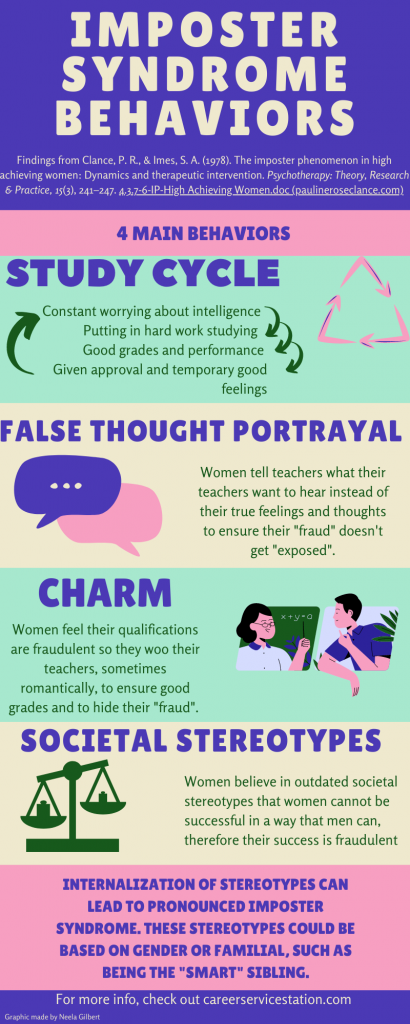What is Imposter Syndrome?
70% of people will have symptoms of imposter syndrome at least once in their lifetime. Additionally, around 75% of female executives across industries reported that they’ve experienced imposter syndrome in their careers. This number is startling, seeing as imposter syndrome is not officially recognized by the American Psychological Association. What is this puzzling syndrome, and how does it significantly impact women?
Touro University defines imposter syndrome as “a collection of feelings of inadequacy that persist even in the face of information to the contrary. People with imposter feelings experience chronic self-doubt and feel like an intellectual fraud.” Fraud is a strong word. However, if you’ve ever felt unqualified to do a job that you’re qualified to do, felt your success is only due to luck, or constantly demean your professional skills, you may be experiencing a varying level of imposter syndrome. The basis for the syndrome is that you are defrauding your colleagues, and you aren’t as qualified for your job as you seem. This syndrome can happen to anyone, but it most strongly affects women.

Being a woman in any workplace can be challenging, as you may be dealing with more minor issues such as being forced to follow high heel specifications in a dress code to more significant issues such as sexual harassment. Imposter syndrome can worsen these issues tremendously. A 1978 study on “The imposter phenomenon in high achieving women: Dynamics and therapeutic intervention” interviewed 150 highly successful white middle-class women (high achieving students, Ph.D. holders, respected professionals, etc.) to find how common this syndrome was amongst successful women. Their interviewees often remarked on not feeling qualified to teach students or feeling surprised when receiving good grades, even with multiple PhDs and years of experience. There were four main behaviors demonstrated in women with imposter syndrome, as shown in the infographic. The main finding from the study is that women can portray many behaviors to hide their perceived “fraud” in the workplace. Although many may not go so far as to date their teachers, you might likely have voiced an opinion in class because you knew your professor would approve of it. Imposter syndrome can also come from internalizing stereotypes constantly put on women while growing up, whether it be being called the “smart” or “dumb” child in your family or being discriminated against by gender.
The main misconception about imposter syndrome is that it’s just another phrase for low self-esteem. The difference between the two is low self-esteem is completely due to internal feelings, while imposter syndrome persists despite physical evidence of a person’s qualifications. If the syndrome is allowed to persist within a person and the person never names their fears to someone, it can fester and lead to detrimental outcomes. For instance, if a person constantly believes that they aren’t qualified for their job, they may turn down a promotion because they have no faith in their qualifications and experience. This is why some of the actions in the infographic may seem extreme, such as charming a teacher, but to the person completing them, the actions are just a desperate way to cover up the perceived fraud they’re committing, even if no one has called them out.
Another main perpetrator of imposter syndrome, other than oneself, can be other women with the same feelings. Forbes found that women tend to attribute their own personal success to luck while men attribute it to their own accomplishments. This can convey the message to other women that in order to gain success, one must have luck. If a friend gets a perfect score on a test or passes their finals in flying colors and chalks it up to luck, to you it may seem that success is unachievable.
Although most imposter syndrome thoughts are internal, side effects of the syndrome can be present externally. Researchers at the US National Library of Medicine and National Institutes of Health wrote in Prevalence, Predictors, and Treatment of Impostor Syndrome: a Systematic Review that high achieving employees with imposter syndrome may experience “increased levels of stress, burnout, and decreased job performance and satisfaction over time.” These factors lead to worse performance, which increases the presence of imposter syndrome. This dangerous cycle can make the once-false thoughts about negative performance real, which only perpetuates the myth as a whole.
What are some other tells of imposter syndrome? A few include:
- Setting high expectations and being disappointed when you can’t complete them
- Fear of asking for help because it will show your fraudulence
- Working harder than necessary to conceal your fraudulence (not to be confused with studying/extra learning because you don’t know the subject material
Researchers have found there to be different “types” of people with imposter syndrome, from the “superhero” to the “natural genius”. Whatever category you may fit into, it’s important to realize your own success and celebrate it within yourself. Internalizing everything allows harmful thoughts to fester and lead to irrational behaviors. Sharing your feelings with others can help you slowly destroy these thoughts of fraudulence. Since 70% of people may experience these kinds of feelings, you are not alone.
Anxiety and Depression Association of America (ADAA) provides information on prevention, treatment and symptoms of anxiety, depression and related conditions (240-485-1001)
